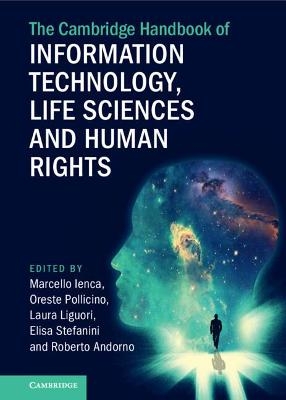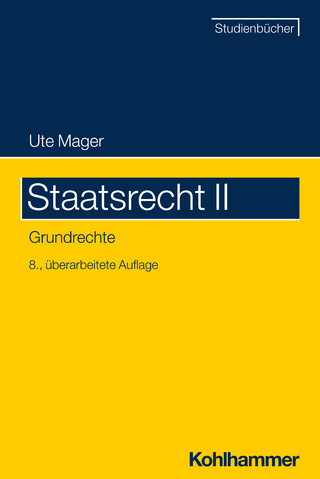
The Cambridge Handbook of Information Technology, Life Sciences and Human Rights
Cambridge University Press (Verlag)
978-1-108-47783-3 (ISBN)
Debates on the human-rights implications of new and emerging technologies have been hampered by the lack of a comprehensive theoretical framework for the complex issues involved. This volume provides that framework, bringing a multidisciplinary and international perspective to the evolution of human rights in the digital and biotechnological era. It delves into the latest frontiers of technological innovation in the life sciences and information technology sectors, such as neurotechnology, robotics, genetic engineering, and artificial intelligence. Leading experts from the technological, medical, and social sciences as well as law, philosophy, and business share their extensive knowledge about the transformation of the rights framework in response to technological innovation. In addition to providing a comprehensive, interdisciplinary, and international state-of-the art descriptive analysis, the volume also offers policy recommendations to protect and promote human rights in the context of emerging socio-technological trends.
Marcello Ienca is a philosopher and cognitive scientist who leads the Intelligent Systems Ethics Group at the College of Humanities (CDH) of the Swiss Federal Institute of Technology in Lausanne (EPFL), Switzerland. Oreste Pollicino is Full Professor of Constitutional Law and Member of the Executive Committee, European Agency for Fundamental Rights and Director of the LLM in Law of Internet Technology, Bocconi University. Laura Liguori is a partner in the Italian law firm Portolano Cavallo focusing on data protection matters privacy and new technologies. Elisa Stefanini is PhD in Constitutional law and partner in the Italian law firm Portolano Cavallo focusing on regulatory matters in the life sciences sector. Roberto Andorno is Associate Professor of biomedical law at the School of Law, and Research Fellow at the Institute of Biomedical Ethics of the University of Zurich, Switzerland.
Introduction Marcello Ienca, Oreste Pollicino, Laura Liguori, Elisa Stefanini and Roberto Andorno; PART I. LIFE SCIENCES AND HUMAN RIGHTS: 1. M-Health at the Crossroads between the Right to Health and the Right to Privacy Oreste Pollicino, Laura Liguori and Elisa Stefanini; 2. Neurorights and the Chilean Initiative Emily Einhorn and Rafael Yuste; 3. Persuasive Technologies and the Right to Mental Liberty: The 'Smart' Rehabilitation of Criminal Offenders Sjors Ligthart, Gerben Meynen and Thomas Douglas; 4. The Ethics and Laws of Medical Big Data Hrefna D. Gunnarsdóttir, I. Glenn Cohen, Timo Minssen, Sara Gerke; 5. The Right to Have a Child: Through the Lens of the Third Phase Reproductive Technologies Judit Sandor; 6. Medical Robots and the Right to Health Care: A Progressive Realisation Robin L. Pierce and Eduard Fosch-Villaronga; 7. Life-maintaining Technology and the Right to Die Federico Gustavo Pizzetti; 8. The Spread of Telemedicine in Daily Practice: Weighing Risks and Benefits Carlo Botrugno; 9. Reproductive Technologies and Reproductive Rights: The Role of Law and Ethics Belinda Bennett and Bernadette Richards; PART II. INFORMATION AND COMMUNICATION TECHNOLOGIES AND HUMAN RIGHTS: 10. The Right to Internet Access: A Comparative Constitutional Legal Framework Oreste Pollicino; 11. Face Recognition and the Right to Stay Anonymous Clare Garvie; 12. Artificial Intelligence and the Right to Algorithmic Transparency Marc Rotenberg; 13. Machine Learning, Cognitive Sovereignty and Data Protection Rights with Respect to Automated Decisions Lee A. Bygrave; 14. Going Dark or Living Forever: The Right to Be Forgotten, Search Engines and Press Archives Peggy Valcke and Simon Verschaeve; 15. Artificial Intelligence and Children's Rights Ronny Bogani and Burkhard Schafer; 16. Internet of Things Devices, Citizen Science Research, and the Right to Science: Ethical and Legal Issues James Scheibner, Anna Jobin and Effy Vayena; 17. Connected but Still Excluded? Digital Exclusion beyond Internet Access Sofia Ranchordás; PART III. TOWARDS A CONVERGENCE: 18. Technological Changes and Rights Evolution in the Bio-digital Era: A Philosophical Overview Marta Bertolaso and Alfredo Marcos; 19. Human Dignity, Life Sciences Technologies and the Renewed Imperative to Preserve Human Freedom Roberto Andorno; 20. Human-Machine Symbiosis and the Hybrid Mind: Implications for Ethics, Law & Human Rights Christoph Bublitz, Jennifer Chandler and Marcello Ienca; 21. Epilogue: Technology, Human Rights and the Future of the Human Marcello Ienca.
| Erscheinungsdatum | 27.04.2022 |
|---|---|
| Reihe/Serie | Cambridge Law Handbooks |
| Zusatzinfo | Worked examples or Exercises |
| Verlagsort | Cambridge |
| Sprache | englisch |
| Maße | 184 x 263 mm |
| Gewicht | 800 g |
| Themenwelt | Recht / Steuern ► EU / Internationales Recht |
| Recht / Steuern ► Öffentliches Recht ► Verfassungsrecht | |
| ISBN-10 | 1-108-47783-6 / 1108477836 |
| ISBN-13 | 978-1-108-47783-3 / 9781108477833 |
| Zustand | Neuware |
| Informationen gemäß Produktsicherheitsverordnung (GPSR) | |
| Haben Sie eine Frage zum Produkt? |
aus dem Bereich


